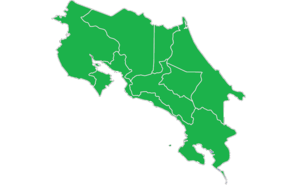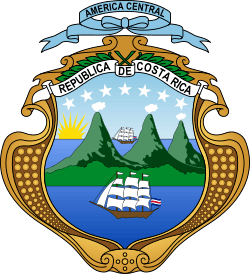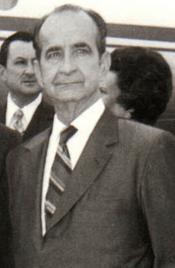Costa Rican general election, 1970
|
| ||||||||||||||||||||
| ||||||||||||||||||||
| ||||||||||||||||||||
 In green provinces won by Figueres | ||||||||||||||||||||
| ||||||||||||||||||||
 |
|---|
| This article is part of a series on the politics and government of Costa Rica |
|
Legislature
|
|
Judiciary
|
|
General elections were held in Costa Rica on 1 February 1970.[1] José Figueres Ferrer of the National Liberation Party won the presidential election, whilst his party also won the parliamentary election. Voter turnout was 83.3%.[2]
On 25 June 1969 the Legislative Assembly of Costa Rica reform the Constitution outlawing presidential reelection, but as any legal reform is retroactive, all previous presidents could be candidates one more time.[3] Two former presidents José Figueres Ferrer and Mario Echandi Jiménez were the two main candidates in the election.
Echandi was nominated by then ruling party National Unification, a right-wing conservative party made out of the merge of the Republicans (Calderonistas) and the National Union (Ulatistas). But the union was starting to break and Ulate presented a separated list for Congress with his Party (unsuccessfully).[3] In the main opposition force and by then dominant-party PLN, the nominee was the historical leader and twice president before José Figueres. Figueres was selected after a primary election (or National Convention as they're known in Costa Rica) in which he defeated then Congressman and former Secretary General of the party, Rodrigo Carazo. The convention was particularly harsh and after the results Figueres did not included any of Carazo supporters in power positions (as was a traditional courtesy), something that future president Carazo resented and made him eventually leave the party. [3]
But National Unification’s forces weren’t in better conditions. Ulate did not endorsed Echandi and left the coalition.[3] Others that left were Virgilio Calvo and Mariano Zúñiga from the calderonist faction that made their own new party; National Front (aka “Third Front”). Ulate promised them the support of this party, but PUN’s General Assembly did not follow his lead and endorsed Echandi’s candidature. The group had minimal impact in the election anyway.[3]
Other minor parties were the Christian Democratic Party led by physician Jorge Arturo Monge Zamora and Socialist Action Party led by former PLN member Marcial Aguiluz Orellana and historical Communist leader Manuel Mora (Communism was still illegal at the time, but the prohibition was flexible on non-explicitly Marxist parties, besides several leaders were already questioning the antidemocratic nature of the measure and calling for it lifting, among them Figueres himself).
Figueres won by a very broad margin over Echandi, 54% over 41% and achieving majority in Parliament. Socialists and Christian Democrats also achieved representation.
Results
President
| Candidate | Party | Votes | % |
|---|---|---|---|
| José Figueres Ferrer | National Liberation Party | 295,883 | 54.8 |
| Mario Echandi Jiménez | National Unification Party | 222,372 | 41.2 |
| Virgilio Calvo Sánchez | National Front | 9,554 | 1.8 |
| Lisímaco Leiva Cubillo | Socialist Action Party | 7,221 | 1.3 |
| Jorge Arturo Monge Zamora | Christian Democratic Party | 5,015 | 0.9 |
| Invalid/blank votes | 22,721 | - | |
| Total | 562,766 | 100 | |
| Source: Nohlen | |||
Parliament
| Party | Votes | % | Seats | +/- |
|---|---|---|---|---|
| National Liberation Party | 269,038 | 50.7 | 32 | +3 |
| National Unification Party | 190,387 | 35.9 | 22 | -4 |
| Socialist Action Party | 29,133 | 5.5 | 2 | New |
| National Front | 16,392 | 3.1 | 0 | New |
| Christian Democratic Party | 13,489 | 2.5 | 1 | New |
| National Unity Party | 6,105 | 1.2 | 0 | New |
| Costa Rican Revolutionary Movement | 3,297 | 0.6 | 0 | New |
| Cartago Agrarian Union Party | 2,394 | 0.5 | 0 | New |
| Invalid/blank votes | 32,253 | - | - | - |
| Total | 562,678 | 100 | 57 | 0 |
| Source: Nohlen | ||||

